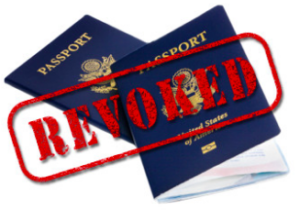Can The IRS Revoke My Passport?
So the short answer to the question is yes, the IRS can revoke your passport if you have a “seriously delinquent” tax debt. But what exactly does that mean? More importantly, what can you do if your passport is at risk of being revoked? Read on to learn more my friend!
Background
On December 4, 2015, President Obama signed the Fixing America’s Surface Transportation (FAST) Act (Pub. L. No. 114-94) into law—the first federal law in over a decade to provide long-term funding certainty for surface transportation infrastructure planning and investment. But like all legislative bills/acts, other things that may appear unrelated often get inserted into them. This act was no different.
Internal Revenue Code Sec. 7345 was enacted as part of the FAST Act. A seriously delinquent tax debt is defined as an unpaid, legally enforceable, and assessed federal tax liability greater than $51,000 (adjusted annually for inflation) and for which:
- The IRS has filed a notice of federal tax lien and the individual’s right to a hearing has been exhausted or lapsed, or
- The IRS has issued a levy.
Generally speaking a federal tax debt is the sum of all current tax obligations, including penalties and interest. However, a “seriously delinquent tax debt” does not include any of the following tax debt even if it meets the criteria stated above:
- Being paid timely with an IRS-approved installment agreement (IA),
- Being paid timely with an offer in compromise (OIC) accepted by the IRS, or a settlement agreement entered with the Justice Department,
- For which a collection due process hearing is timely requested regarding a levy to collect the debt,
- For which collection has been suspended because a request for innocent spouse relief under IRC § 6015 has been made
Furthermore, a passport won’t be at risk under this program for any taxpayer:
- Who is in bankruptcy
- Who is identified by the IRS as a victim of tax-related identity theft
- Whose account the IRS has determined is currently not collectible (CNC) due to hardship
- Who is located within a federally declared disaster area
- Who has a request pending with the IRS for an installment agreement (IA)
- Who has a pending offer in compromise (OIC) with the IRS
- Who has an IRS accepted adjustment that will satisfy the debt in full
What the IRS does when you have a seriously delinquent tax debt
The IRS is required to notify you in writing at the time the IRS certifies seriously delinquent tax debt to the State Department. This is done via IRS notice CP 508C. If you have been certified to the Department of State by the Secretary of the Treasury as having a seriously delinquent tax debt, you cannot be issued a U.S. passport and your current U.S. passport may be revoked.
How do you resolve the situation?
The IRS will reverse a certification when the tax debt no longer qualifies as a seriously delinquent tax debt. This happens when:
-
- The tax debt is fully satisfied or becomes legally unenforceable.
- The tax debt is no longer seriously delinquent meaning:
- You and the IRS enter into an installment agreement allowing you to pay the debt over time.
- The IRS accepts an offer in compromise to satisfy the debt.
- The Justice Department enters into a settlement agreement to satisfy the debt.
- Collection is suspended because you request innocent spouse relief under IRC § 6015.
- You make a timely request for a collection due process hearing regarding a levy to collect the debt.
- The certification is erroneous.
The IRS will make this reversal within 30 days and provide notification to the State Department as soon as practicable.
The IRS will not reverse certification where a taxpayer requests a collection due process hearing or innocent spouse relief on a debt that is not the basis of the certification. Also, the IRS will not reverse the certification because the taxpayer pays the debt below $50,000. So…if you have been notified that your tax debt has been certified, you should consider:
- paying the tax owed in full,
- entering into an installment agreement, or
- making an offer in compromise.
But what if the IRS made an error?
The State Department is held harmless in these matters and cannot be sued for any erroneous notification or failed decertification under IRC § 7345. If you believe that the IRS certified your debt to the State Department in error, you can file suit in the U.S. Tax Court or a U.S. District Court to have the court determine whether the certification is erroneous or the IRS failed to reverse the certification when it was required to do so. If the court determines the certification is erroneous or should be reversed, it can order the IRS to notify the State Department that the certification was in error.
Can I contact the State Department to find out the status of my passport?
The State Department does not have any information about your seriously delinquent tax debt. For questions, or to resolve your seriously delinquent tax debt, they recommend that you contact the IRS via phone at 1-855-519-4965 (1-267-941-1004 international) of via mail at:
Department of the Treasury
Internal Revenue Service
Attn: Passport
PO Box 8208
Philadelphia, PA 19101-8208
How can we help?
As you can tell from above, the IRS will only really reverse the certification if the debt is no longer enforceable (i.e. collectable) or if you enter into a resolution option (i.e. payment plan, currently not collectible, etc).
With regards to enforceability, the IRS only has 10 years from the date of assessment to collect on unpaid taxes. If you are getting letters, your debt is more than likely still active. But do you know when it will expire? This is called the CSED date.
While you could go through the hassle of calculating your CSED (see this blog post), do you really want to? For a flat fee, and us filing a few forms with the IRS (with your consent), we’ll look at however many years you want to analyze, and provide you with a comprehensive report that will include:
- Total tax assessment, penalty, interest and accrual amounts for each year (so you know how much you really owe)
- CSED calculations for each year requested (i.e. when your debt will expire)
- Tolling events (if any) and the days your CSED has been extended
- All IRS notices sent/received for each year
- IRS account activity by year
- And much, much more (we promise)
If your debt will not expire for some time, we are fully authorized to represent your before the IRS and can can help negotiate a resolution option (i.e. IA, OIC, CNC) that will satisfy the IRS conditions to have your certification revoked/lifted. You can learn more about our representation services by visiting the IRS Debt Representation page or reading the IRS Talk post within our blog.
When you are ready to get started, simply call us at (773) 239-8850 or click our email address at the bottom of this screen.



